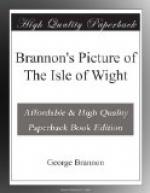* * * * *
Local Biography and History.
The following are amongst the most eminent natives of the island:
Sir JOHN CHEEKE, Knt., one of the most distinguished scholars and virtuous men of his time: he was tutor to Edward VI, and a zealous protestant, but being induced during the following reign to make a public recantation, his death, which happened soon after, was supposed to have been hastened by shame of that humiliating exhibition.
Rev. HENRY COLE, D.D.,
Dean of St. Paul’s, a contemporary of the
above, was born at Godshill:
he shone in divinity and literature,
and was a strenuous
advocate of the Roman-catholic faith.
THOs. JAMES, D.D.,
a learned divine and antiquary: was esteemed,
from his extensive erudition,
a living library, Born at Newport,
died 1629.
ROBERT HOOK, M.D., celebrated for his extraordinary inventive powers in almost every branch of art and science, was born at Freshwater anno 1635, and died at an advanced age, in Gresham College.
JOHN HOBSON, rose by his skill and courage from the obscurity of a tailor’s parish-apprentice to an admiral’s rank in the reign of Queen Anne: he headed Sir George Rooke’s squadron in the attack on Vigo harbour, where a numerous Spanish fleet was entirely captured or burned.—The little village of Bonchurch claims the honor of his birth-place.
We shall conclude this general chapter with a brief summary of the local history, though the annals of a small dependent isle like this, cannot be expected to possess any very exciting interest.
[In fact it can boast of no important ancient settlements or records—no valued chronicles of the alternate successes and defeats of ambitious rival princes and their contending armies, or the unpitied sufferings of the sacrificed population: and perhaps it would never have been mentioned in the national history, had it not been for the imprisonment of fallen royalty in the case of Charles I. Its situation certainly exposed it to the attacks of Danish pirates, and subsequently of the French; but these distant events constituting but a broken and unconnected narrative, the ensuing brief sketch will we presume be sufficient for the majority of our readers. We refer those who wish further information on the subject to the valuable work of Sir Richard Worsley,—from which this article is partly abridged.]
It was subdued by the Roman troops under Vespasian, A.D. 43; but the conquerors could not have experienced much resistance from the natives, as no remains of their military works have been here discovered. Under the empire, the island was reckoned to contain about 1200 families.
The Saxon kings of the South of England several times attacked the island with their accustomed unsparing ferocity: particularly Cerdic,




